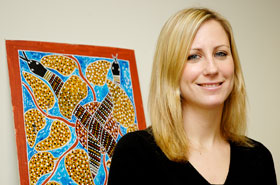  |
| HOME | THIS ISSUE | CALENDAR | GRANTS | BACK ISSUES | < BACK | NEXT > |
Anthropology grad student explores Christianity in aboriginal settlementby Sherry Fisher - February 27, 2006 |
||||
|
It was uncharted territory for Carolyn Schwarz, and nothing but instruction in the Yolngu language could have prepared her for it. Schwarz spent 17 months in the most remote part of northern Australia on the island of Galiwin’ku, where she lived with the Yolngu, an aboriginal settlement of about 2,000. She was there to conduct field work for her dissertation. “I was interested in religion, particularly how indigenous peoples interpreted Christianity,” she says, “and how Christianity and Western religious systems either came together or conflicted with one another. There hadn’t been much work on introduced religious practices in aboriginal Australia.” Schwarz, who is working on her doctorate in anthropology, has a year-long fellowship for 2005-2006 from the University’s Humanities Institute. Her dissertation is titled “Why Does ‘Religion’ Matter?: Power, Identity, and Daily Life in a Yolngu Community, Australia.” It examines how the Yolngu people define what they see as religious behaviors, religious values, and religious identities in their day-to-day negotiations with one another and with the world beyond their settlements. Her goal is to show why and for whom religion and religious behaviors matter in the aboriginal community, which was evangelized in 1942 by Methodist missionaries. Christians in the settlement make up about 10 percent of the adult population. Schwarz says that while she often heard people asserting, “Ngarra Garraywalangumirr dirramu” (I am a man with God inside) or “Ngarra yaka Christian miyalk” (I am a non-Christian woman), these articulations are far more complicated than the labels imply. Christian identification and Christianity are affected by power relations – real and perceived – and social positioning, all of which are at the center of my analysis,” she says. During her stay, Schwarz lived with her “adopted” Yolngu family. Much of her time early on was spent interacting with people. “I would sit with them, listen to conversations, and write down words and ask what they meant. I formed friendships. Essentially, I was there to do research, but at the same time you need to get to know people and have them trust you.” Later in her stay she taped interviews. “Kinship is the most important aspect of the society,” she says, noting that large families live together in relatively small houses. Most of the time, she shared a room with two to three other people. “Being alone is considered a pitiful condition in their society,” says Schwarz. “Everyone wants to be around each other all the time.”
That took a toll on Schwarz, particularly during the early part of her stay. “Everybody shares, be it food, money or clothing. So it was perfectly acceptable for someone to ask for a bite of another’s sandwich or for a sip of someone’s drink.” But when she returned to the U.S., she suffered “reverse culture shock. “I was so used to being around people all the time, surrounded by kin,” she says. “I had rarely eaten anything alone.” In Western society, “religion is treated as being something separate,” she says, “But in aboriginal societies, religious beliefs are not as separated – politics and religion are one and the same. Religion is a way of life. It carries over into mundane activities, such as exchanging food, negotiating for money and receiving access to vehicles.” Based on her studies and the few researchers who have written about aboriginal Christianity, Schwarz says, “Being a Christian is not only a religious identity. It’s about social behavior toward others; a code of conduct that you adhere to. For example - and this has to do with egalitarian principles as well – being humble. Someone who acts bossy or loud would be considered a false Christian. Someone who carries themselves in an unpretentious way, doesn’t engage in making trouble, shares, and helps others is considered a true Christian.” Studying anthropology is amazing,” she says. “It forces you to think outside of yourself and outside our societal constructs, in terms of what is ‘normal.’ It makes you rethink your societal norms and values.” She cites the Yolngu people’s childrearing as an example. “Children sleep with parents,” she says. “In the first house I stayed in, six children and their parents slept in one room on two mattresses. Nobody wants to sleep alone. In their culture, somebody sleeping alone is vulnerable to sorcery.” She adds, “Children are indulged, but they are taught to share. If there’s a piece of candy, you break it off and share it. And you always pick up a crying child and find out what the child wants. To leave a child crying is considered neglectful.” |
| ADVANCE HOME UCONN HOME |

